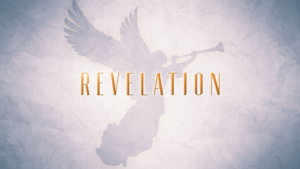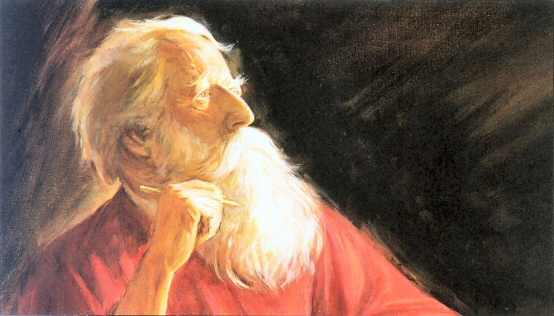By: Brian Chilton | November 14, 2017

As a teenager, I remember being a bit frightened of the book of Revelation. The smell of acne face cleanser filled the room as I dove into mysterious depictions of four-faced angels, beasts from the sea and land, of massive angels, and 100-pound hailstones being hurled to the earth. While Revelation holds mysterious and frightening images of the end-times, the book of Revelation was written to be an encouragement to Christians of all times. But, who was it that penned the word of Revelation? This article will conclude our series titled “Who Wrote the New Testament?” as we investigate the author of the book of Revelation.
Author: Tradition has long held that John the apostle, whom we have seen penned the Fourth Gospel and the three letters attributed to him, wrote the last book of Scripture. If so, John penned much of the New Testament, with only Paul and Luke writing more than him. While there were skeptics, even early on, about the authorship of the text (most likely due to the apocalyptic nature of the book), the general consensus was that John the apostle was the author. Four reasons exist as to why one should accept Johannine authorship of Revelation.
1) The author identifies himself as “John” in Revelation 1:4; 1:9; and 22:8. This does not necessarily indicate that this John was John the apostle. We know of a John Mark, who penned the Second Gospel, and a possible John the Elder (although it is possible that John the apostle was also known as John the Elder in some instances, yet there are reasons to believe that another John could have lived as a church leader, especially since “John” was a popular name).
2) The author of the book clearly had a strong connection with the seven churches of Asia Minor as evident in Revelation 2:1-3:22. Tradition states that John the apostle served as the pastor to the churches in Ephesus.
3) The author’s circumstances greatly match those of John the apostle. Second-century sources indicate that John was exiled to the Isle of Patmos. Ignatius (35-107 AD) writes of particular conclusive facts in that “Peter was crucified; Paul and James were slain with the sword; John was banished to Patmos; Stephen was stoned to death by the Jews who killed the Lord? But, [in truth,] none of these sufferings were in vain; for the Lord was really crucified by the ungodly.”[1] John the apostle’s exile matches what we find of the author of Revelation (1:9).
4) Throughout the text, Old Testament images indicate one who has been thoroughly immersed with a Hebrew education and upbringing. John the apostle matches that requirement.
5) The Lexham Bible Dictionary discusses a finding called the Harris Fragments. Accordingly, these fragments give further insight to the writings of Polycarp (69-150 AD), a disciple of John. The fragments “offer unique insight into reconciling John’s martyrdom and his reported long life and natural death in that:
- They support the second-century church tradition that John the Apostle, the son of Zebedee, lived a long life in Ephesus after suffering exile on Patmos, and died a peaceful death.
- They account for the fulfillment of Jesus’ prophecy about the martyr’s death that John the son of Zebedee would die.”[2]
From what we have gathered, John the apostle is the clearest candidate for authorship of Revelation. I ascribe to the mentality, “If it isn’t broken, don’t fix it.” Long held traditions should only be overturned if there is clear evidence to the contrary. I do not see that with the tradition that John the apostle authored the last book of Scripture. Quite honestly (as you have seen if you have read all my entries on this matter), I do not see any compelling reason to reject the traditional authorship ascribed to any book of the canonical New Testament.
Date: Interestingly, some scholars are dating Revelation earlier than what has been traditionally held due to the thoroughly Jewish imagery found in the text. Those holding an older view for the dating of Revelation promote the late 60s as the time the book was written. However, the view that the book was written later in the first-century, most likely in the late 80s or early 90s holds greater strength.
Purpose: As mentioned at the beginning of the article, Revelation was not given to scare us. Rather, it was written to encourage believers of all times that despite the troubles faced, God will win in the end. Good will triumph evil. The powers of darkness will be confined by the powers of light. Revelation tells us much about God, Christ, humanity, sin, the church, angels, as well as Satan and his demonic forces.
The book hosts an introduction (1:1-8); letters given to the seven Churches of Asia (2:1-3:22); depictions of what will happen in the end-times by three septets—seven seals leading to seven trumpets leading to seven bowls of wrath—ultimately leading to a new heaven and a new earth (4:1-22:5); and a conclusion (22:6-21).
Be encouraged by Revelation! God gave John the apostle this vision for a reason. It was to let us know that the believer should hold an eternal perspective understanding that God has won, is winning, and will win in the end.
Notes
[1] Pseudo-Ignatius of Antioch, “The Epistle of Ignatius to the Tarsians, Chapter III,” in The Apostolic Fathers with Justin Martyr and Irenaeus, ed. Alexander Roberts, James Donaldson, and A. Cleveland Coxe, vol. 1, The Ante-Nicene Fathers (Buffalo, NY: Christian Literature Company, 1885), 107.
[2] Tracee D. Hackel, “John the Apostle, Critical Issues,” ed. John D. Barry et al., The Lexham Bible Dictionary (Bellingham, WA: Lexham Press, 2016).
For your listening enjoyment, the Gaither Vocal Band performs “John the Revelator.”
About the Author
 Brian Chilton is the founder of BellatorChristi.com and is the host of The Bellator Christi Podcast. He received his Master of Divinity in Theology from Liberty University (with high distinction); his Bachelor of Science in Religious Studies and Philosophy from Gardner-Webb University (with honors); and received certification in Christian Apologetics from Biola University. Brian is currently a student of the Ph.D. program in Theology and Apologetics at Liberty University. Brian is full member of the International Society of Christian Apologetics and the Christian Apologetics Alliance. Brian has been in the ministry for over 14 years and serves as the pastor of Huntsville Baptist Church in Yadkinville, North Carolina.
Brian Chilton is the founder of BellatorChristi.com and is the host of The Bellator Christi Podcast. He received his Master of Divinity in Theology from Liberty University (with high distinction); his Bachelor of Science in Religious Studies and Philosophy from Gardner-Webb University (with honors); and received certification in Christian Apologetics from Biola University. Brian is currently a student of the Ph.D. program in Theology and Apologetics at Liberty University. Brian is full member of the International Society of Christian Apologetics and the Christian Apologetics Alliance. Brian has been in the ministry for over 14 years and serves as the pastor of Huntsville Baptist Church in Yadkinville, North Carolina.
© 2017. BellatorChristi.com.






[…] https://bellatorchristi.com/2017/11/14/who-wrote-the-book-of-revelation/ […]